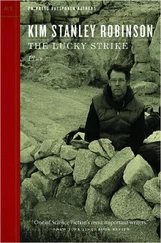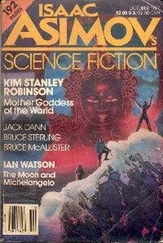“By God we are a team!” Arthur cries as they describe the day’s work. “Eileen, you should put us together more often. Don’t you agree, Roger?”
Roger grins, nods at Eileen. “That was fun.”
Marie and Eileen leave for the camp below, and Arthur and Roger cook a big pot of stew and trade climbing stories, scores of them: And every one ends, “but that was nothing compared to today.”
Heavy snow returns and traps them in their tents, and it’s all they can do to keep the high camp supplied. “Bloody desperate out!” Marie complains, as if she can’t believe how bad it is. After one bad afternoon Stephan and Arthur are in the high camp, Eileen and Roger in the middle camp, and Hans, Marie, and Dougal in the low camp with all the supplies. The storm strikes Roger and Eileen’s tent so hard they are considering bringing in some rocks to weight it down more. A buzz sounds from their radio and Eileen picks it up.
“Eileen, this is Arthur. I’m afraid Stephan has come up too fast.”
Eileen scowls fearfully, swears under her breath. Stephan has gone from low camp to high in two days’ hard climbing.
“He’s very short of breath, and he’s spitting up bloody spit. And talking like a madman.”
“I’m okay!” Stephan shouts through the static. “I’m fine!”
“Shut up! You’re not fine! Eileen, did you hear that? I’m afraid he’s got edema.”
“Yeah,” Eileen says. “Has he got a headache?”
“No. It’s just his lungs right now, I think. Shut up! I can hear his chest bubbling, you know.”
“Yeah. Pulse up?”
“Pulse weak and rapid, yeah.”
“Damn.” Eileen looks at Roger. “Put him on max oxygen.”
“I already have. Still . . .”
“I know. We’ve got to get him down.”
“I’m okay!”
“Yeah,” Arthur says. “He needs to come down, at least to your camp, maybe lower.”
“Damn it,” Eileen exclaims when off the radio. “I moved him up too fast.”
An hour later—calls made below, the whole camp in action—Roger and Eileen are out in the storm again, in the dark, their helmet headlights showing them only a portion of the snowfall. They cannot afford to wait until morning—pulmonary edema can be quickly fatal, and the best treatment by far is to get the victim lower, where his lungs can clear out the excess water. Even a small drop in altitude can make a dramatic difference. So off they go; Roger takes the lead and bashes ice from the rope, jumars up, scrabbles over the rock blindly with his crampon tips to get a purchase in the snow and ice. It is bitterly cold. They reach the bottom of the blank wall pitch that so impressed Roger, and the going is treacherous. He wonders how they will get Stephan down it. The fixed rope is the only thing making the ascent possible, but it does less and less to aid them as ice coats it and the rock face. Wind hammers them, and Roger has a sudden very acute sensation of the empty space behind them. The headlamps’ beams reveal only swirling snow. Fear adds its own kind of chill to the mix.
By the time they reach high camp Stephan is quite ill. No more protests from him. “I don’t know how we’ll get him down,” Arthur says anxiously. “I gave him a small shot of morphine to get the peripheral veins to start dilating.”
“Good. We’ll just have to truss him into a harness and lower him.”
“Easier said than done, in this stuff.”
Stephan is barely conscious, coughing and hacking with every breath. Pulmonary edema fills the lungs with water; unless the process is reversed, he will drown. Just getting him into the sling (another function of the little wall tents) is hard work. Then outside again—struck by the wind—and to the fixed ropes. Roger descends first, Eileen and Arthur lower Stephan using a power reel, and Roger collects him like a large bundle of laundry. After standing him upright and knocking the frozen spittle from the bottom of his mask, Roger waits for the other two, and when they arrive he starts down again. The descent seems endless, and everyone gets dangerously cold. Windblown snow, the rock face, omnipresent cold: nothing else in the world. At the end of one drop Roger cannot undo the knot at the end of his belay line, to send it back up for Stephan. For fifteen minutes he struggles with the frozen knot, which resembles a wet iron pretzel. Nothing to cut it off with either. For a while it seems they will all freeze to death because he can’t untie a knot. Finally he takes his climbing gloves off and pulls at the thing with his bare fingers until it comes loose.
Eventually they arrive at the lower camp, where Hans and Dougal are waiting with a medical kit. Stephan is zipped into a sleeping bag, and given a diuretic and some more morphine. Rest and the drop in altitude should see him back to health, although at the moment his skin is blue and his breathing ragged: no guarantees. He could die—a man who might live a thousand years—and suddenly their whole enterprise seems crazy. His coughs sound weak behind the oxygen mask, which hisses madly on maximum flow.
“He should be okay,” Hans pronounces. “Won’t know for sure for several hours.”
But there they are—seven people in two wall tents. “We’ll go back up,” Eileen says, looking to Roger. He nods.
And they go back out again. The swirl of white snow in their headlights, the cold, the buffets of wind. . .they are tired, and progress is slow. Roger slips once and the jumars don’t catch on the icy rope for about three meters, where they suddenly grab hold and test his harness, and the piton above. A fall! The spurt of fear gives him a second wind. Stubbornly he decides that much of his difficulty is mental. It’s dark and windy, but really the only difference between this and his daytime climbs during the last week is the cold, and the fact that he can’t see much. But the helmet lamps do allow him to see—he is at the center of a shifting white sphere, and the rock he must work on is revealed. It is covered with a sheet of ice and impacted snow, and where the ice is clear it gleams in the light like glass laid over the black rock beneath. Crampons are great in this—the sharp front points stick in the snow and ice firmly, and the only problem is the brittle black glass that will break away from the points in big jagged sheets. Even black ice can be distinguished in the bright bluish gleam of the lights, so the work is quite possible. Look at it as just another climb, he urges himself, meanwhile kicking like a maniac with his left foot to spike clear a crack where he can nail in another piton to replace a bad hold. The dizzying freeness of a pull over an outcropping; the long reach up for a solid knob: He becomes aware of the work as a sort of game, a set of problems to be solved despite cold or thirst or fatigue (his hands are beginning to tire from the long night’s hauling, so that each hold hurts). Seen that way, it all changes. Now the wind is an opponent to be beaten, but also to be respected. The same of course is true of the rock, his principal opponent—and it is a daunting one, an opponent to challenge him to his utmost performance. He kicks into a slope of hard snow and ascends rapidly.
He looks down as Eileen kicks up the slope: quick reminder of the stakes of this game. The light on the top of her helmet makes her look like a deep-sea fish. She reaches him quickly; one long-gloved hand over the wall’s top, and she joins him with a smooth contraction of the biceps. Strong woman, Roger thinks, but decides to take another lead anyway. He is in a mood now where he doubts anyone but Dougal could lead as fast.
Up through the murk they climb.
An odd point is that the two climbers can scarcely communicate. Roger “hears” Eileen through varieties of tugging on the rope linking them. If he takes too long to study a difficult spot above, he feels a mild interrogatory tug on the rope. Two tugs when Roger is belaying means she’s on her way up. Very taut belaying betrays her belief that he is in a difficult section. So communication by rope can be fairly complex and subtle. But aside from it, and the infrequent shout with the mask pulled up to one side (which includes the punishment of a face full of spindrift) they are isolated. Mute partners. The exchange of lead goes well—one passes the other with a wave—the belay is ready. Up Eileen goes. Roger watches and holds the belay taut. Little time for contemplating their situation, thankfully; but while taking a rest on crampon points in steps chopped out with his ice axe, Roger feels acutely the thereness of his position, cut off from past or future, irrevocably in this moment, on this cliff face that drops away bottomlessly, extends up forever. Unless he climbs well, there will never be any other reality.
Читать дальше
Конец ознакомительного отрывка
Купить книгу












